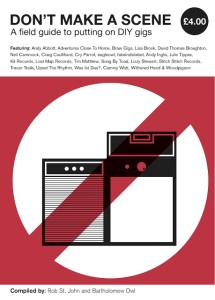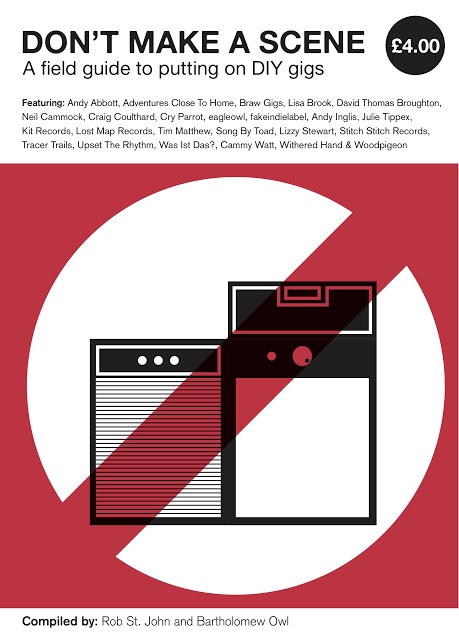
Putting on DIY gigs is rewarding, fun and often important in bringing communities of musicians, artists, writers, photographers and audiences together in spaces removed from the mainstream and in places largely absent from tour itineraries. However, without inspiration and information from others, it can seem daunting to try and get started.
Don’t Make a Scene have responded to this need with a new zine about DIY gigs entitled ‘Don’t Make a Scene: a field guide to putting on DIY gigs.’ A group of DIY promoters, musicians, label heads, tour managers, bookers, sound engineers and audience members from across the UK draw from their own experiences to offer advice and resources in the form of articles, interviews, illustrations and photographs. What results is a diverse, informative and easily digested how-to (and how-not-to) guide for the fledgling promoter.
To celebrate it’s release Rob and Bart the folks at Don’t Make a Scene have put together some thoughts on ‘What to think of when putting on a gig?’
Be communicative
Throughout the zine, one thing that keeps cropping up is the importance of communication. This can’t be stressed hard enough. Ensure you have a contact number for the number for the bands and for the venue, if there’s any last minute change of plans. Respond to emails timely. Even if its a short acknowledgement to let them know when you’ll give a full response – its important to keep communicating.
Be realistic
Whether you’re putting on your first show, or you’ve been doing it for years – things go wrong. The important thing is to be realistic and open with everyone involved. Make sure your guarantee is reasonable and managable. Manage expectations as much as possible. “Only promise what you can achieve”. (Steve Brett – ‘Make The Scene You Want to See’)
Be positive
‘DIY is a manifestation of love’. (Andy Abbott – ‘DIY Bother? Reasons To Keep Doing It.’) People get involved as they want to put on the bands that they love. So you’re basically asking an audience to share in your excitement about a gig. If you aren’t excited about seeing a show, you can’t expect a paying audience to be. Gigs can be stressful and infuriating – but we do it because we love it. Don’t lose sight of why you decided to start putting on shows in the first place.
Contingency
As a general rule, everything takes longer than you think. When organising stage times, changeovers, sound checks, etc – its best to air on the side of caution. There’s nothing worse than having to cut a headline act short as you’re running into your curfew time.
The first edition of ‘Don’t Make a Scene: a field guide to putting on DIY gigs’ was limited to 300 copies and released on 24th November 2014, reasonably priced at £4, and will is available for order through dontmakeascene.co.uk. Don’t Make a Scene was riso printed by Footprint Workers Co-op in Leeds using soy inks on recycled paper.
The contributors to Don’t Make a Scene are largely drawn from people that the zine compilers Rob St. John and Bartholomew Owl (from Edinburgh band eagleowl) have worked with or been inspired by in their collaborative promoting and music making over the last decade.
Contributors to include Chris Tipton (Upset the Rhythm, London: ‘Curate your event with imagination, honour and taste’), Sofia Hagberg (End of the Road / Sam and Sofia, Sheffield: ‘Advancing a show’), Emily Tracer Trails (Edinburgh and Glasgow: ‘A guide to not losing money on gigs’), Fielding Hope (Cry Parrot / Cafe Oto, Glasgow / London: ‘Applying for funding’), Andy Inglis (5000 / former manager of the Luminaire, London: ‘We’re good at taking things for free’), Johnny Lynch (Lost Map, Isle of Eigg: ‘Some things I’ve learnt about putting on gigs’) and Andy Abbott (That Fucking Tank / Wharf Chambers, Leeds: ‘DIY bother? Reasons to keep doing it’) and many more.




